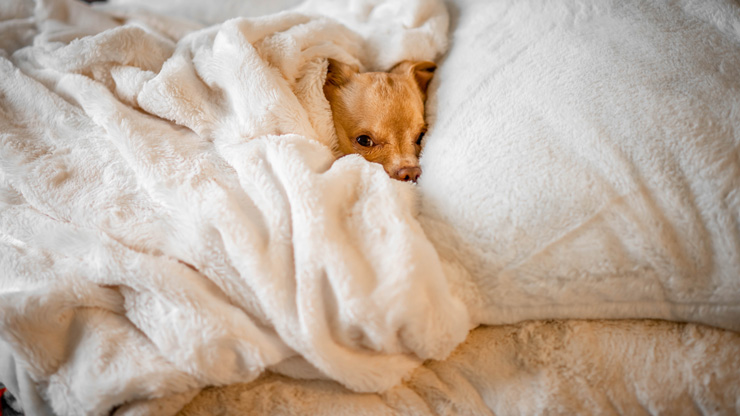
Despite old wives’ tales, there are mental and physical health benefits to sleeping with your pet… follow these guidelines to keep you and your pets safe
—
The age old advice to not sleep with your pets is now seen as slightly outdated. In fact, there are studies that show that catnapping with kitties or taking a nap with your pup certainly won’t kill you. But what about those people vulnerable to health issues? Or light sleepers? Will our pets transit disease or parasites or will they in fact improve our mental health and help us catch forty winks?
To answer those questions, let’s look at the impact of sleeping with our pets:
Sleeping together is safe if you’re both healthy
The current scientific consensus shows that if you and your dog are both in good health, then sleeping together is safe. You may have to deal with a dog that’s restless or a cat that’s nocturnal, but it’s not going to cause much of a problem for your sleeping habits if neither of you is ill with fever, fleas, or some other malady. If you do have some sort of health problem, however, then you’ll want to sleep in separate beds until it is resolved since it is possible for people and pets to share some diseases and illnesses. If you are not sure about a condition, talk to your vet or doctor and find out before you put you or your pet at risk.
Sleeping together can be good for your mental health
A lot of people bring their pets into their bed because they have trouble sleeping without their dog or cat near them. This is particularly true of people who are single or live by themselves since pets can provide so much comfort, companionship, and heat! Bedtime can be an important time for bonding. It can also help with separation anxiety for both the human and pet, especially if the human is away from their pet throughout most of the day because of work or school.
Sleeping together requires cleanliness
We talked about how you should sleep separately from your pet if either of you is sick, but there are other considerations to keep in mind as well. For instance, a pet that is shedding might cause some problems, especially if you have allergies or breathing issues exasperated by pet dander. If this is your situation, you may want to bathe or brush your pet before going to bed to reduce allergens and irritants. It’s also a good idea to wash out your bedding regularly, or at least dust off or shake off your bedding each night before you go to sleep. This will greatly reduce the number of irritants in the room and make it easier to sleep soundly.
Sleeping together doesn’t have to be in the same bed
Interestingly, an American Kennel Club survey reported that 45% of dog owners let their dog sleep in their bed, while 20% crate their dog, and 17% use a dog bed. If your pet disturbs your sleep, one possible workaround is to get them their own bed or crate. This way they can still be nearby but are less likely to physically interrupt your sleep. The best dog crates are designed to stop your pet interrupting your sleep, but it means you can also keep them in the room — as long as they are not a snorer!
Sleeping together with kids can be tricky
Is it okay to let your kids sleep with their pets? The answer depends on the kids, their sleeping habits, and how responsible they are. If your kids roll around in their sleep, or if they tend to sleepwalk, then letting pets sleep with them is probably not a good idea. If your kids have a habit of grabbing at the pets as they sleep, or if they are rough with their pets during the daytime, then you could end up with some miserable pets by morning.
So, if you have heard horror stories of people sleeping with their pets and getting sick, you can probably dismiss most of those as instances where either the pet or human were just sick at the time. Assuming you and your pet get regular checkups, then you can create safe sleeping arrangements for both you and your pets by following these simple guidelines.
You may also enjoy reading A Ritual for Rest: How Stretching Before Bed Can Improve Sleep by McKenzie Dillon